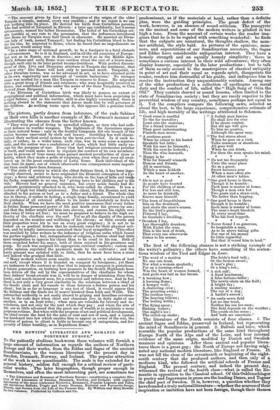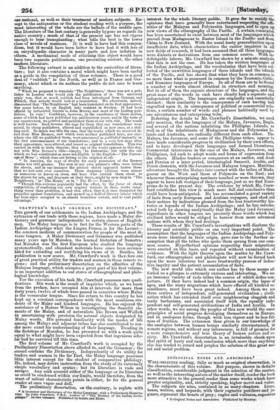THE HOWITTS' LITERATURE AND ROMANCE OF NORTHERN EUROPE. * To the
patiently studious bookworm these volumes will furnish a large amount of information as regards the • authors of Northern Europe and their works, from the Eddas and Sagas of the ancient &midins, vians, to the various literature of the present day in Sweden, Denmark, Norway, and Iceland. The popular attraction of the work is more questionable. The scale is too extended for a general history, seldom full enough for a critical review of parti- cular works. The later biographies, though proper enough in themselves, and often the most interesting part, are sometimes too • The Literature and Romance of Northern Europe: constituting a complete His- tory of the Literature of Sweden, Denmark. Norway, and Iceland; with copious Specimens of the most celebrated Histories, Romances, Popular Legends and Tales, old chivalrous Ballads, Tragic and Comic Dramas, National and Favourite Songs, Novels, and Scenes from the Life of the Present Day. By William and Mary Hewitt. In two volumes. Published by Colburn and Co. predominant, as if the materials at hand, rather than a definite plan, were the guiding principles. The great defect of the work, however, is an absence of sound criticism. The panegyric" on the ancient and some of the modern writers is pitched in too high a tone. From the account of certain works the reader ima- gines that he is to be regaled with something wonderful: he finds that the subjects are unnatural, the thoughts shallow, the man- ner artificial, the style bald. As pictures of the opinions, man- ners, and superstitions of our Scandinavian ancestors, the Sagas and Eddas have considerable antiquarian interest. They have a homely strength and an equally homely simplicity; there is sometimes a curious interest in their wild adventures; they often. display humour, especially in the later productions : but to talk of them as only second to the masterpieces of classical antiquity in point of art and their equal as regards spirit, disappoints the reader, renders him distrustful of his guide, and indisposes him to receive the instruction they unquestionably contain. Among one- of the older productions is a collection of apothegms on moral duty and the conduct of life, called the " High Song of Odin the. Old." They contain shrewd or sound lessons, often limited to the state of Scandinavian society ; but they are rarely superior to the proverbial wisdom of any country, sometimes perhaps not equal to it. Yet the compilers compare the following saws, selected as about the best, to the large experience, comprehensive estimate of life, and high morality of the writings attributed to Solomon.
" Good sense is needful " A foolish man fancies To the far traveller ; He shall live for ever Least errs the cautious; If he shuns combat. For a friend trustier But old age will give Than good understanding To him no quarter, Findeth man never. Although the spear may.
":A cautious guest "The fool stares about When he comes to his hostel When he goes on a visit, Speaketh but little ; Talks nonsense or slumbers.
With his ears he listeneth ; All goes well
With his eyes he looketh ; When he can drink, Thus the wise learneth. For then the man speaks his mind.
" Happy is he • • * Who for himself winnetb " Do not too frequently Honour and friends. Unto the same place All is uncertain, Go as a guest. Which a man holdeth Sweet becomes sour In the heart of another. When a man often sits • • * At other men's tables.
" Ale is not so good " One good house is there, As people have boasted Though it be humble : For the children of men. Each man is master at home.
For less and still less, Though a man own but As more he drinketh, Two goats and a straw-rick, Knows man himself. 'Tis better than begging.
"The hem of forgetfulness " One good house is there Sits on the drunkard, Though it be humble ; And steals the man's senses. Each man is master at home.
By the bird's pinions, The man's heart bleedeth Fettered I lay, At every meal-time In Gunlada's dwelling. Who his food beggeth. "Drunken I lay, • • * Lay thoroughly drunken, " Never found I so generous,
With Fjalar the wise. So hospitable a man,
This is the best of drink, As to be above taking gifts.
That every one afterwards Nor one of his money
Comes to his senses. So little regardful • 4 • But that it vexed him to lend."
" The word of a maiden No one can trust, Nor what a woman speaketh ; For on a turning-wheel Was the heart of woman formed, " A sick calf; And guile was laid in her breast. A freed bondsman " A breaking bow ; A false fortune-teller ; • A burning flame; The newly-slain on the field ; A hungry wolf ; A bright sky ; A chattering crow ; A smiling master ; The grunting swine; The cry of a dog ; The rootless tree; A harlot's sorrow ; The heaving billows ; " An early-sown field The boiling kettle ; Let no one trust, " The flying spear ; Neither his son too soon ; Sinking waters; The field depends on the weather ; One night's ice ; The youth on his sense ; The coded-up snake ; And both are uncertain."
The literature of the North consists of four classes. 1. The ancient Sagas and Eddas, preserved in Iceland, but representing the mind of Scandinavia in general. 2. Ballads and tales, which resemble the popular productions of the same kind throughout Europe North of the Alps and of the Loire, and bear internal evidence of the same origin, modified by Danish and Swedish manners and opinions. After these ancient and popular litera- tures there is a great gap ; the North of Europe not having origi- nated any national modern literature, like England or France. It was not till the close of the seventeenth or beginning of the eight- eenth century that she produced authors, and then only of a mediocre kind, who followed the artificial schools of France and England. The present century, and indeed the present day, witnessed the revival of the fourth class—what is called the Ro- mantic in opposition to the Classical school. Of this Oehlenschlager in poetry and Ingermann inprose are the leading Danes, and Tegner the chief poet of Sweden. It is, however, a question whether they have founded a truly nationalliterature—whether the sources of their inspiration or imitation have not been foreign, though their themes. The first of the following stanzas is not a striking example of the writer's gallantry ; the others have something of the senten- tious wisdom of the Fool and Edgar in Lear.
The bride's fond talk ; Or the broken sword ; A bear's play ; Or a king s son ;
are national, as well as their treatment of modern subjects. Ex- cept to the antiquarian or the student reading with a purpose, the most interesting of the whole are the ballads of the middle ages. The literature of the last century is generally bygone as regards its native country ; much of that of the present age has not vigour enough to bear transplanting ; what tells the best is the lower class of novels of manners. It is well to have had this compen- dium, but it would have been better to have had it with less of an. encyclopaedic character in many parts and less• inflation in others. A. mechanical mode of attaining this object would have been two separate publications, one presenting ancient, the other modern literature.
The following extract is an addition to the curiosities of litera- ture ; but it also contains a moral which might have been useful as a guide in the compilation of these volumes. There is a good. deal of "rubbish." in the North, as well as in France and Ger- many, about which or its authors the public- do not care to learn anything. " When we proposed to translate.' The Neighbours,' there was not a pub- lisher in London who would risk the publication of it. The universal reply was, that so much rubbish had been introduced from German and French, that nobody would look at a translation-. We afterwards, indeed, discovered that The Neighbours' had been translated on its first appearance, fwe years before, by an English lady resident in Sweden. It had been offered by influential friends. to John. Murray and most of the leading pub- lishers. In vain ! Confident,, however, in the excellence of these stories, some of which had been published ten and fourteen years, and in the taste of our countrymen, we printed- and published them at our own risk. The result is well known. Such became the rage for them that our translations were seized, by cheap publishers, altered and republished as new ones, at a shil- ling each. So much was this' the ease, that the works which we received di- rect from Miss Bremer,. and which were neither published here, nor any- where else till we published them were announced as published instantly on the first announcement of our dunslations; and in a very few days after their appearance,, were altered,-and issued as original translations. This was carried on with so little disguise, that one of the works appears to this day, not with Miss Bremer's title—simply, In Daleearlia,' but with the one which we had substituted as more intelligible to the English—' The Parson- age of Mora' ; which does not belong to the original at all. " In America, the rage of rivalry for early possession of the Bremer stories was still greater. The men in our own painter's office were bribed for sheets, and in one instance the piiated sheets appeared before those that we had sent over ourselves. These sixpenny editions were almost as numerous as leaves on trees, and boys who carried them about in the streets for sale, and draymen on their drays, might be seen deep in The Neighbours, ' Home,' or in ' The H— Family.' "Though this extreme popularity had the effect, by the furor of cheap competition, of rendering our own original venture in these works some- thing worse than profitless, it had this effect, that it at once dissipated the prejudice against translations, and opened up a field of literary labour which has been since occupied to an almost boundless extent, and to vast public advantage."



























 Previous page
Previous page